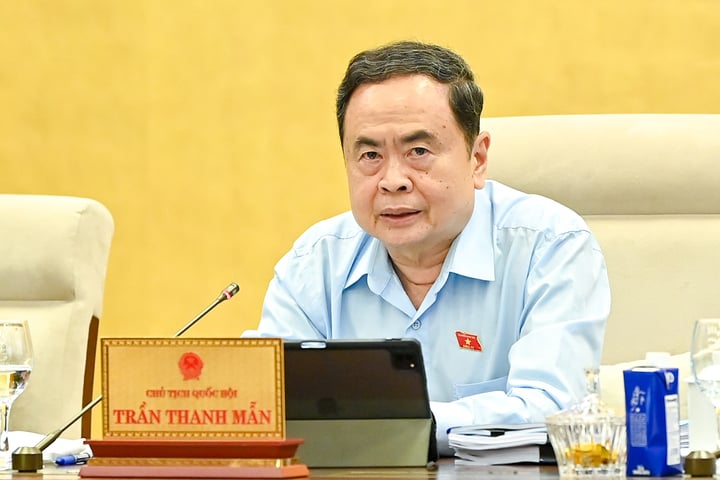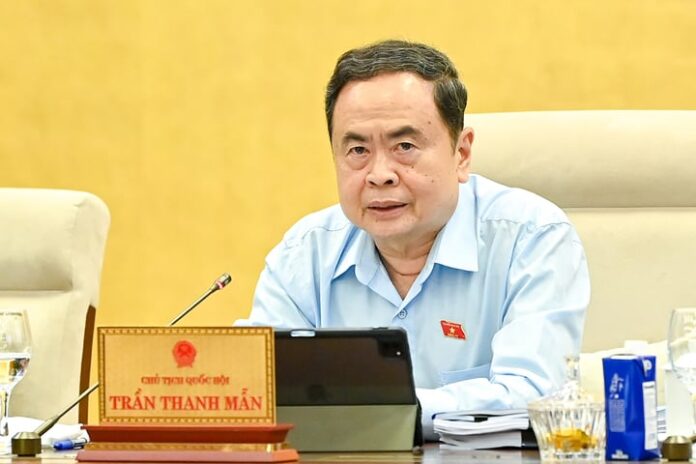National Assembly Chairman Tran Thanh Man shared his opinion on absorbing, explaining, and editing the draft Law amending and supplementing a number of articles of the Law on Standards and Technical Regulations at the 46th meeting of the National Assembly Standing Committee on the morning of June 3rd.

National Assembly Chairman Tran Thanh Man
Chairman Tran Thanh Man evaluated that the draft law is very redundant, verbose, and obscure. Therefore, it is necessary to carefully review each clause, article, and chapter of the law.
The Chairman emphasized that the biggest challenge currently lies in the lengthy and time-consuming procedures, which cause inconvenience to citizens and businesses. Hence, there is a need to review and delegate authority to the Government when appropriate, allowing the law to focus on the main framework.
“When there are cases of counterfeit, substandard, or poor-quality goods, no agency takes primary responsibility. Therefore, when enacting this law, the responsibilities of the National Assembly, the Government, and related ministries must be clear to address this issue,” the Chairman illustrated with a real-life example.
Chairman Tran Thanh Man also suggested enhancing transparency and practicality in developing technical regulations and standards and encouraging the participation of businesses. Moreover, the law should take effect immediately upon promulgation to serve the urgent goal of double-digit growth, bypassing the stage of waiting for decrees and circulars.
Sharing her thoughts at the meeting, Nguyen Thanh Hai, Chairwoman of the Committee for Deputy Affairs, mentioned that some opinions suggested removing the regulation on conformity announcement. She proposed not abolishing it but rather adjusting the content regarding the conformity announcement procedure, aiming to streamline and update the system of standards in harmony with international norms and, most importantly, digitizing the conformity announcement process.

Chairwoman of the Committee for Deputy Affairs, Nguyen Thanh Hai
Ms. Nguyen Thanh Hai emphasized the numerous benefits of the conformity announcement regulation, including ensuring product quality and safety (especially for goods affecting health and the environment), protecting consumers, creating a level playing field, and avoiding trade barriers.
However, the current challenge lies in the implementation process, which causes inconvenience to businesses, overlaps between managing ministries, a lack of transparency, and potential negative consequences.
“Recent cases discovered and investigated by competent authorities and reported by the press, such as fake milk, rice, and medicine, highlight the importance of product quality linked to consumer protection and people’s health and lives, which deserves continued attention,” emphasized the Chairwoman of the Committee for Deputy Affairs.
According to Ms. Nguyen Thanh Hai, these are the reasons why conformity standards cannot be abolished. Instead, there should be strengthened inspection and supervision to avoid generating administrative procedures that inconvenience businesses or create opportunities for corruption.
Vice Chairwoman of the National Assembly, Nguyen Thi Thanh, stated that many issues have arisen, so law-making must create a favorable legal corridor without compromising rigor and control, which could lead to consequences.
For instance, regarding the responsibilities of state management agencies, Ms. Nguyen Thi Thanh suggested clearly defining and supplementing the law to create a facilitative legal framework that also ensures management within a defined framework.
Previously, in a report on explaining, absorbing, and editing the draft Law on the regulation of conformity announcement, the National Assembly’s Committee on Science, Technology, and Environment affirmed that conformity announcement is a necessary and crucial tool for effective state management, consumer protection, and enhancing enterprise reputation, and thus should not be eliminated.
To overcome the redundancy in conformity assessment activities, which incurs costs for enterprises (as they must comply with the regulations on conformity announcement under the Law on Standards and Technical Regulations and the requirements of specialized laws), the draft Law broadens the use of conformity assessment results as a basis for conformity announcement.
The draft Law also exempts products that fully meet the quality management requirements specified in the specialized laws from conformity announcement, allowing enterprises to follow one procedure instead of two, as is currently the case.
To minimize administrative procedures and costs for businesses and promote the digitization of conformity announcement registration, the draft Law has simplified the conformity registration provisions. Accordingly, organizations and individuals only need to notify their conformity announcement on the national database for standards, measurement, and quality.
“Concerns Over Wasteful Office Space Usage: A Balancing Act for Efficient Utilization”
Chairman of the National Assembly Tran Thanh Man emphasized the importance of effectively handling the relocation of administrative headquarters during the reorganization of administrative units.
The Supreme People’s Court Requests Chief Justice to Respond to Provincial People’s Council’s Questions
The Supreme People’s Court of Vietnam has proposed retaining a provision in the draft resolution amending and supplementing several articles of the Constitution. The proposal suggests that the chief justices of provincial-level courts should continue to be accountable to the People’s Councils through a question-and-answer session.





















